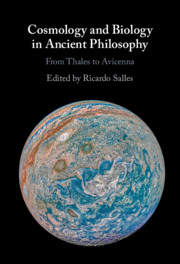Book contents
- Cosmology and Biology in Ancient Philosophy
- Cosmology and Biology in Ancient Philosophy
- Copyright page
- Contents
- Contributors
- Acknowledgements
- Introduction The Intersection of Biology and Cosmology in Ancient Philosophy
- Chapter 1 Souls and Cosmos before Plato
- Chapter 2 The Ensouled Cosmos in Plato’s Timaeus
- Chapter 3 Platonic ‘Desmology’ and the Body of the World Animal (Tim. 30c–34a)
- Chapter 4 The World Soul Takes Command
- Chapter 5 Begotten and Made
- Chapter 6 The De Motu Animalium on the Movement of the Heavens
- Chapter 7 Biology and Cosmology in Aristotle
- Chapter 8 Recapitulation Theory and Transcendental Morphology in Antiquity
- Chapter 9 The Stoics’ Empiricist Model of Divine Thought
- Chapter 10 Why Is the Cosmos Intelligent?
- Chapter 11 Cardiology and Cosmology in Post-Chrysippean Stoicism
- Chapter 12 The Agency of the World
- Chapter 13 God and the Material World
- Chapter 14 At the Intersection of Cosmology and Biology
- Chapter 15 Is the Heaven an Animal?
- References
- Index
- Index Locorum
Chapter 12 - The Agency of the World
Published online by Cambridge University Press: 21 May 2021
- Cosmology and Biology in Ancient Philosophy
- Cosmology and Biology in Ancient Philosophy
- Copyright page
- Contents
- Contributors
- Acknowledgements
- Introduction The Intersection of Biology and Cosmology in Ancient Philosophy
- Chapter 1 Souls and Cosmos before Plato
- Chapter 2 The Ensouled Cosmos in Plato’s Timaeus
- Chapter 3 Platonic ‘Desmology’ and the Body of the World Animal (Tim. 30c–34a)
- Chapter 4 The World Soul Takes Command
- Chapter 5 Begotten and Made
- Chapter 6 The De Motu Animalium on the Movement of the Heavens
- Chapter 7 Biology and Cosmology in Aristotle
- Chapter 8 Recapitulation Theory and Transcendental Morphology in Antiquity
- Chapter 9 The Stoics’ Empiricist Model of Divine Thought
- Chapter 10 Why Is the Cosmos Intelligent?
- Chapter 11 Cardiology and Cosmology in Post-Chrysippean Stoicism
- Chapter 12 The Agency of the World
- Chapter 13 God and the Material World
- Chapter 14 At the Intersection of Cosmology and Biology
- Chapter 15 Is the Heaven an Animal?
- References
- Index
- Index Locorum
Summary
The chapter explores how the Stoics account for the totality of movement in the cosmos – in other words, the agency of the world. The Stoics take the world to be a complex and divine living-being. Their physics combines what today we might call physics, biology and theology. The Stoics put forward two premises that appear to be in tension. First, they claim that the active principle is the sole source of movement and cause of everything. Second, they offer a scala naturae according to which kinds of entities differ by the way in which they move and jointly co-cause all movement in the world. This One-Many Problem is the Stoic version of what is later called the problem of free will and determinism, or so I argue. As the Stoics conceive of the problem, the challenge consists in showing how both premises – One Cause and Many Causes – are true. The Stoic approach strikes me as attractive, both because it looks at humans together with animals and other parts of the world and because of its upshot for human agency. Our reasoning, including our decision-making, constitutes some of the causes that co-cause the world’s overall movements. What remains puzzling, however, is that our reasoning is subject to norms. Ultimately, I argue, the puzzle is how norms for practical reasoning fit into the physical world. This reconstruction does justice to the evidence. It recognizes that the Stoics address human movement in the context of a scala naturae. And it predicts what indeed we find: a wide range of texts about the status of human assent, indicative of the awareness that this is not an easy topic.
- Type
- Chapter
- Information
- Cosmology and Biology in Ancient PhilosophyFrom Thales to Avicenna, pp. 208 - 223Publisher: Cambridge University PressPrint publication year: 2021



